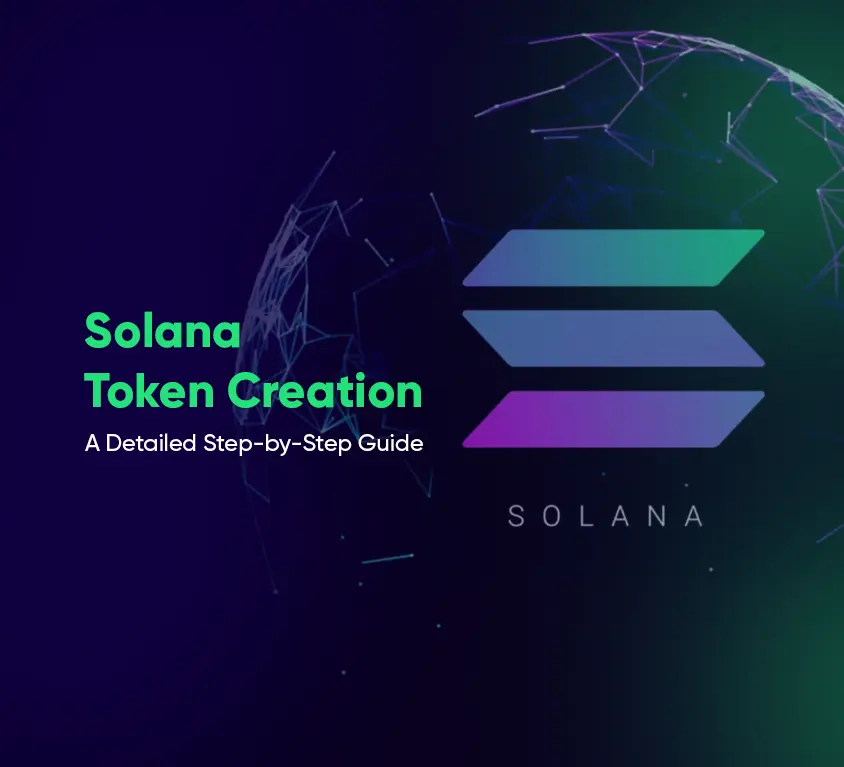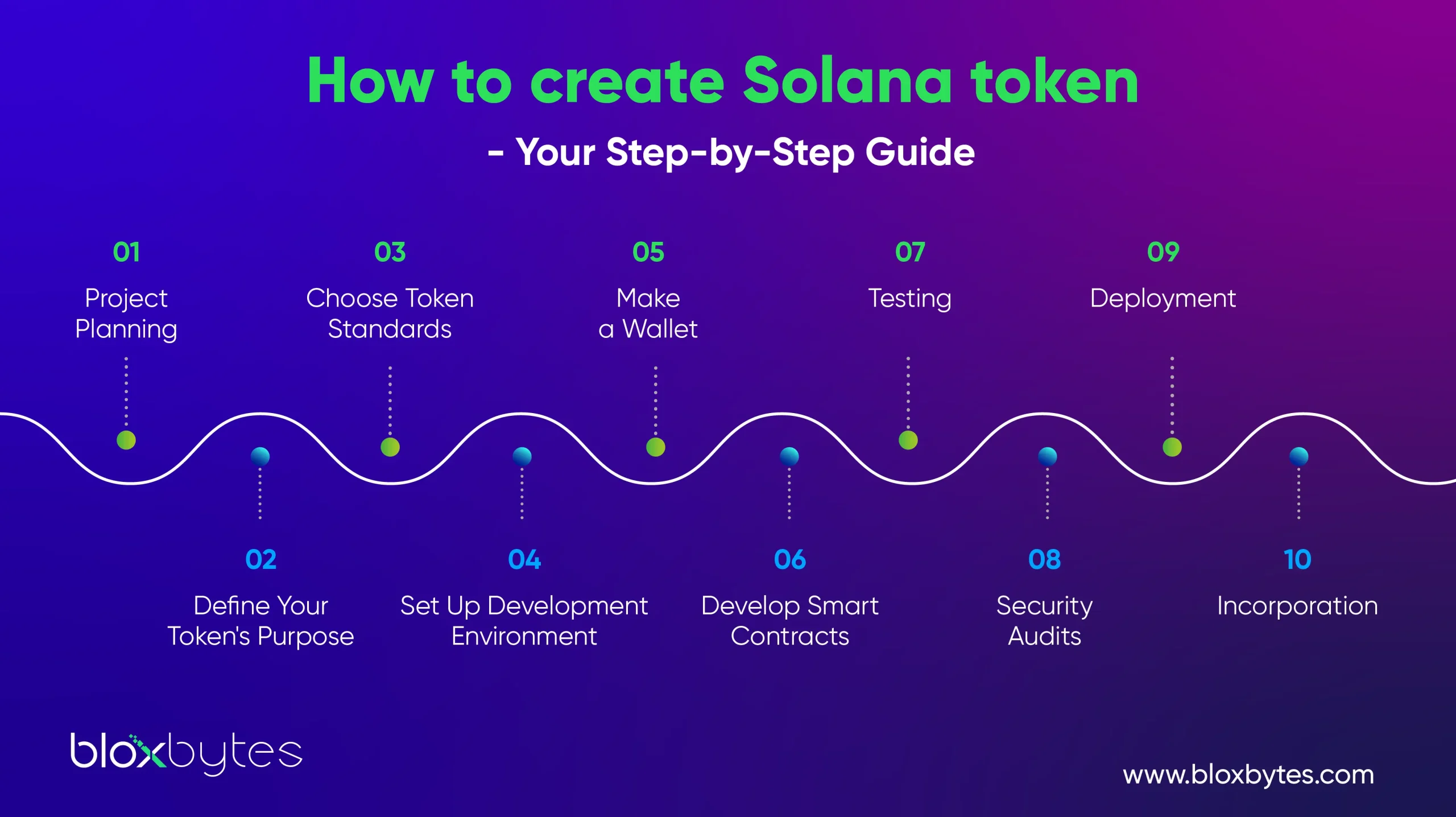
Introduction
Web3 & Blockchain Consultancy :
Solana Token Creation: A Detailed Step-by-Step Guide
Solana emerges as a powerhouse of speed and efficiency within the dynamic blockchain ecosystem, boasting a market capitalization of $24.27 billion USD. This makes developing tokens on Solana an appealing prospect for enthusiasts looking to engage with this exceptional platform. Known for its remarkable transaction speeds, low costs, and scalability, Solana is becoming a preferred choice for many. Moreover, Solana’s unique combination of Proof of History (PoH) and Proof of Stake (PoS) in its architecture not only distinguishes it but also provides a robust and efficient environment for top token development firms.Key Takeaways
- How to Create Solana Token: Follow a structured process, including setting up the environment, defining the token, developing smart contracts, testing, and deployment.
- Benefits of Solana Token: Solana offers high throughput, low transaction costs, scalability, and robust security, making it an ideal platform for token development.
- Diverse Applications of Solana Network: Solana tokens find applications across various industries, including DeFi, NFTs, gaming, and real-world asset tokenization.
- Potential for Innovation: As Solana’s ecosystem continues to grow, new and innovative use cases for Solana-based tokens are expected to emerge, presenting exciting opportunities for developers and businesses alike.
What are SPL Tokens?
First, let’s understand what Solana SPL tokens are. SPL (Solana Program Library) tokens refer to the standard for creating and managing tokens on the Solana blockchain. Solana, recognized for its high performance and low latency, has emerged as a popular platform for decentralized applications (DApps), decentralized finance (DeFi) projects, and non-fungible tokens (NFTs). The SPL token standard provides a set of guidelines and specifications for the creation and interaction of tokens on Solana. These tokens can represent various digital or real-world assets, including fungible tokens like cryptocurrencies and non-fungible tokens representing unique digital items. Key characteristics of SPL tokens on Solana include:- Speed and Scalability: Solana’s remarkable throughput and low transaction costs position it as an optimal platform for token creation and transactions, facilitating swift and cost-effective token transfers.
- Interoperability: SPL tokens are meticulously designed to seamlessly interact with other Solana-based applications and smart contracts, fostering interoperability within the Solana ecosystem.
- Programmability: Developers can leverage Solana’s programmable framework to craft custom smart contracts and integrate complex functionalities into their tokens, accommodating a diverse range of use cases.
- Security: Built on the Solana blockchain, SPL tokens inherit the security features of the underlying network, benefiting from Solana’s robust consensus mechanism and infrastructure.
- User-Friendly: Solana prioritizes user-friendliness by offering a developer-friendly environment. Tools like the SPL Solana Token Creator simplify the process of creating and managing tokens, ensuring accessibility to a broader audience.
How to create Solana token – Your Step-by-Step Guide
Developing a token on the Solana blockchain involves several intricate steps, from initial project planning to deployment. Engaging professional blockchain experts for guidance can be invaluable. Here is a streamlined procedure for creating a Solana token on the Solana blockchain.
Step 1: Project Planning
Begin with thorough project planning and business consulting with your chosen token development company. Clear understanding and meticulous planning are crucial for efficient and successful project development.
Step 2: Define Your Token’s Purpose
Understand what your token will be used for and what features it will have. Figure out who will use it and what they want. Make sure the number of tokens, how they are given out, and what they can do match what you want to achieve.
Step 3: Choose Token Standards
Solana follows the SPL (Solana Program Library) token standard. Decide if you’ll use the standard SPL Token or make a custom one to fit your project better.
Step 4: Set Up Development Environment
Install the necessary tools – Set up the Solana Command-Line Interface (CLI), Rust programming language, and other required development tools.
Step 5: Make a Wallet
Create a Solana wallet to hold and control your tokens. Put some SOL (Solana’s own cryptocurrency) in it to pay for transactions.
Step 6: Develop Smart Contracts
Develop smart contracts using the Rust programming language. Utilize the Solana Token Program library for token-related functionality, and implement the desired logic for your token, such as minting, burning, and transferring.
Step 7: Testing
Check your smart contracts carefully for mistakes or problems. Use the Solana Testnet to check how your token works before you launch it for real.
Step 8: Security Audits
Conduct security audits on your smart contracts to ensure they are secure against potential vulnerabilities. Engage third-party security auditors or firms specializing in blockchain security.
Step 9: Deployment
Deploy your smart contracts to the Solana Mainnet once you are confident in their security and functionality. Ensure you have sufficient SOL to cover deployment costs.
Step 10: Incorporation
Blend your token with suitable platforms, wallets, or decentralized applications (DApps) to encourage widespread use.
The steps and tools for Solana token development may vary based on the complexity and unique features of your project. It is advisable to seek assistance from an experienced token development company with skilled blockchain professionals to ensure a smooth development process.Token Development – Solana vs Ethereum
Creating a Solana token offers several advantages over Ethereum, primarily due to Solana’s exceptional throughput, affordability, and scalability. The innovative Proof-of-History consensus mechanism in Solana accelerates transaction confirmations, allowing for thousands of transactions per second. This heightened efficiency leads to much lower fees than those found on Ethereum, enhancing cost-effectiveness for both token creation and transactions. Moreover, Solana’s environment is particularly conducive to developers, thanks to its user-friendly setup and extensive documentation, which simplify the development process significantly. Furthermore, Solana’s capability to scale effectively supports the expansion of decentralized applications (DApps) without a hitch. While Ethereum is a solid platform in its own right, the performance-centric features of Solana make it a more attractive option for token development, especially for projects that prioritize rapid transaction speeds, reduced costs, and improved scalability.Benefits of Creating a Solana Token
Token development on the Solana blockchain presents numerous advantages, making it an appealing choice for a variety of projects. Here are some key benefits:- High Throughput: Solana is renowned for its ability to process thousands of transactions per second, ensuring rapid and efficient token transactions, especially beneficial for projects with high-frequency activities.
- Low Transaction Costs: Solana’s minimal transaction fees contribute to cost-effective token development, particularly advantageous for projects involving microtransactions or frequent transfers.
- Scalability: Solana’s architecture is designed to scale effortlessly as user adoption grows, crucial for projects with expanding user bases.
- Fast Confirmation Times: Solana’s quick block times lead to speedy transaction confirmations, beneficial for applications requiring near-instantaneous transaction finality, such as decentralized exchanges or gaming platforms.
- Developer-Friendly Environment: Solana provides robust developer tools, documentation, and support, fostering a conducive environment for token development. Developers can leverage a variety of resources to streamline the creation and deployment of tokens.
- Security: Solana utilizes advanced cryptographic techniques and consensus mechanisms like Proof-of-History to enhance security, ensuring a secure environment for token transactions and smart contract execution.
- Smart Contract Capabilities: Solana supports smart contracts, enabling developers to implement complex logic within tokens or decentralized applications, expanding the functionality and use cases for Solana-based tokens.
- Ecosystem Growth: Solana has witnessed significant ecosystem growth, with various projects and decentralized applications opting to build on its platform. This growing ecosystem presents opportunities for partnerships and integrations.